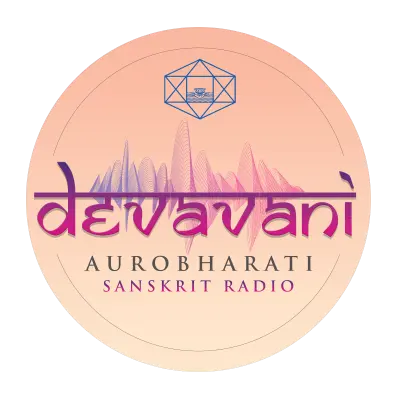Devabhasha – A Language of the Divine Origin
Location: Society House and Online via Zoom
Institute: AuroBharati
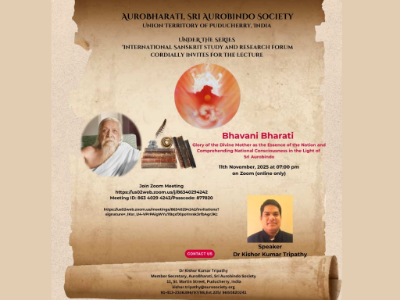 It is of the utmost value to a nation, a human group-soul, to preserve its language and to make of it a strong and living cultural instrument. A nation, race or people which loses its language, cannot live its whole life or its real life.
It is of the utmost value to a nation, a human group-soul, to preserve its language and to make of it a strong and living cultural instrument. A nation, race or people which loses its language, cannot live its whole life or its real life.
Sri Aurobindo
It would be better to learn Sanskrit and try to make it a truly living language.
The Mother
As a mark of celebrating the Sanskrit Day, AuroBharati, AuroBharati, Sri Aurobindo Society, Puducherry under the series ‘International Sanskrit study and research forum organized a workshop on “Devabhasha: A Language of the Divine Origin” and a lecture on “Bhavani Bharati: Glory of the Divine Mother as the Essence of the Nation and Comprehending National Consciousness in the Light of Sri Aurobindo” on 11th November, 2025.
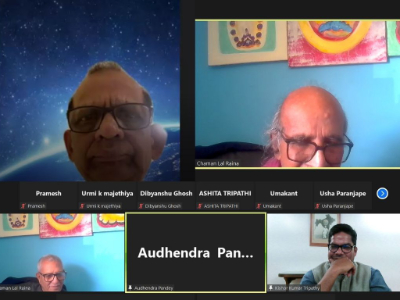 November 11th is regarded as a significant day for Sanskrit at the Sri Aurobindo Ashram, recognized as Sanskrit Day in honor of The Mother’s impactful remarks about the language made in 1967. In her speech, The Mother made a clear distinction regarding the living, spiritual nature of the Sanskrit language.
November 11th is regarded as a significant day for Sanskrit at the Sri Aurobindo Ashram, recognized as Sanskrit Day in honor of The Mother’s impactful remarks about the language made in 1967. In her speech, The Mother made a clear distinction regarding the living, spiritual nature of the Sanskrit language.
This annual event was created to pay tribute to her insights and to foster a more profound relationship with Sanskrit. The celebration highlights a “revitalized Sanskrit” that is straightforward, dynamic, and imbued with spirit, as opposed to a lifeless or contrived academic interpretation. It centers on the concept of Sanskrit as a bridge linking the past to the future.
Workshop on “Devabhasha: A Language of the Divine Origin” was co-ordinated by Dr Kishor Kumar Tripathy and he emphasized on Sanskrit is the language in which India’s soul is reflected and expressed. Dr Tripathy spoke about the vision of the Mother on the significance of Sanskrit as a language of consciousness. Dr Tripathy emphasized on the diversity of cultural expressions and cultural unity of India and the expansion based on philological perspectives of Sanskrit.
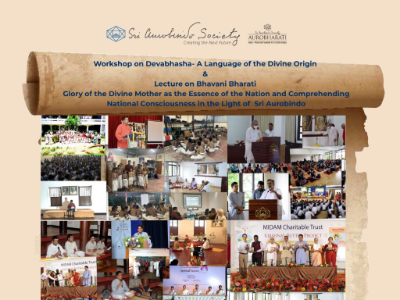 On this occasion, Dr Kishor Kumar Tripathy also presented a Lecture on “Bhavani Bharati: Glory of the Divine Mother as the Essence of the Nation and Comprehending National Consciousness in the Light of Sri Aurobindo.” Bhavani Bharati is Sri Aurobindo’s only poem in Sanskrit, written between 1904 and 1908. It has 99 verses mostly in the “Upajati” metre which is an apt choice for emoting heroism, power, anger, war. Confiscated by the Calcutta Police, this piece was rediscovered in 1985. The poem depicts the victory of the Shakti, the Mother of the nation, over Ignorance and Evil.
On this occasion, Dr Kishor Kumar Tripathy also presented a Lecture on “Bhavani Bharati: Glory of the Divine Mother as the Essence of the Nation and Comprehending National Consciousness in the Light of Sri Aurobindo.” Bhavani Bharati is Sri Aurobindo’s only poem in Sanskrit, written between 1904 and 1908. It has 99 verses mostly in the “Upajati” metre which is an apt choice for emoting heroism, power, anger, war. Confiscated by the Calcutta Police, this piece was rediscovered in 1985. The poem depicts the victory of the Shakti, the Mother of the nation, over Ignorance and Evil.
Dr. Tripathy highlighted the essence of nationalism rooted in the profound concepts of Sri Aurobindo, particularly focusing on India’s unity, cultural nationalism, and the continuity of the nation through the supreme Shakti.
He recounted the compelling nationalist epic that embodies India as the goddess Bhavani, representing the nation’s divine Shakti. He noted that this work, created during the Indian freedom struggle, connecting spirituality with patriotism, encouraging Indians to awaken their inner strength for liberation.
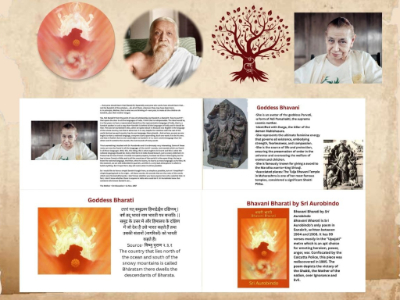 The poem portrays India’s freedom as a sacred endeavor, merging Vedic imagery with revolutionary fervor. It encapsulates Sri Aurobindo’s conviction that true political freedom must stem from spiritual awakening and divine inspiration.
The poem portrays India’s freedom as a sacred endeavor, merging Vedic imagery with revolutionary fervor. It encapsulates Sri Aurobindo’s conviction that true political freedom must stem from spiritual awakening and divine inspiration.
The Sri Aurobindo Society has undertaken substantial initiatives to promote Sanskrit as a language of consciousness, with a focus on developing digital platforms and community outreach initiatives. During this event, notable discussions were held by esteemed scholars such as Shri Audhendra Pandey, Prof. Chaman Lal Raina, Shri Ram Narayan Ji, along with numerous other scholars and devotees from various institutions.
